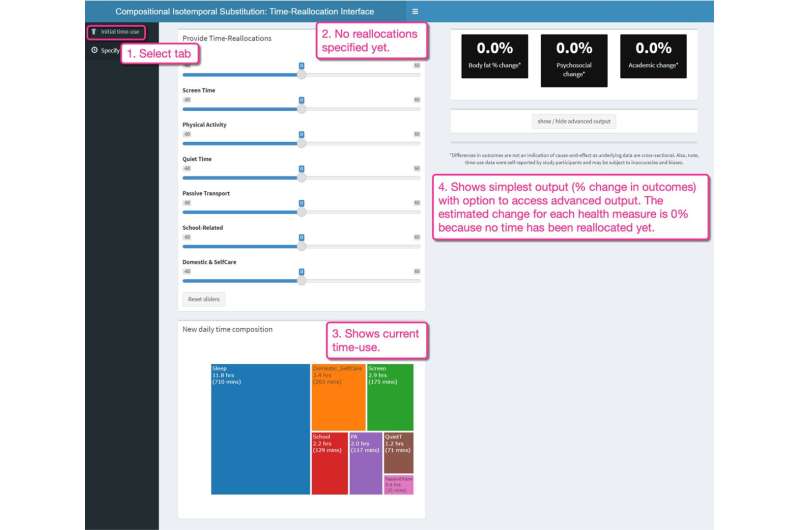
Researchers studying how children’s daily activities are associated with their health have developed a web app that shows users how reallocating time in their day from one activity to another could impact their health and academic performance. The new app and the data used to develop it are described in a paper published this week in the open-access journal PLOS ONE by Dorothea Dumuid of University of South Australia and colleagues.
How we use our time may affect our health, well-being and productivity, but the relationships between time use and outcomes can be challenging for both health professionals and the general public to interpret.
In the new study, the researchers used data on 1,685 eleven-to-twelve year-old children enrolled in the Australian Child Health CheckPoint study. Time spent in daily activities was derived from a self-reported 24-hour recall tool in which children recalled the activities they did on the previous day with a granularity of 5 minutes. Data on body fat percentage, psychosocial health and academic performance were also available for each participant. They discovered that, following adjustments for age, socioeconomics and puberty status, how people used their time was significantly associated with body fat percentage (F=2.66, p<0.001), psychosocial health (F=4.02, p<0.001) and academic performance (F=2.76, p<0.001).
To convey the strength of these associations in an easy-to-understand and interactive way, the authors developed a web app, dubbed Healthy-Day-App in which users input their initial time allocations and then view how changes to their time use would be associated with outcomes. For instance, reallocating 60 minutes from screen time to physical activity is associated, on average, with 4.2% lower body fat (-0.8 [95% CI -1.0 to -0.5] percentage units), 2.5% better psychosocial health (+1.9 [1.4 to 2.5] PedsQL psychosocial health score) and 0.9% higher academic performance (+4.5 [1.8 to 7.2] NAPLAN writing score). However, the benefits may be lessened if the time for physical activity is reallocated from other activities.
The authors say that the Healthy-Day-App is the first to allow customized estimation of the impact of time allocations and that it may enable better engagements with and understanding of the data not only by researchers but also public health promoters, medical practitioners, fitness professionals, policymakers and members of the general public.
Source: Read Full Article
